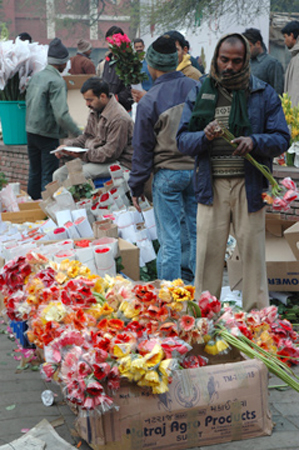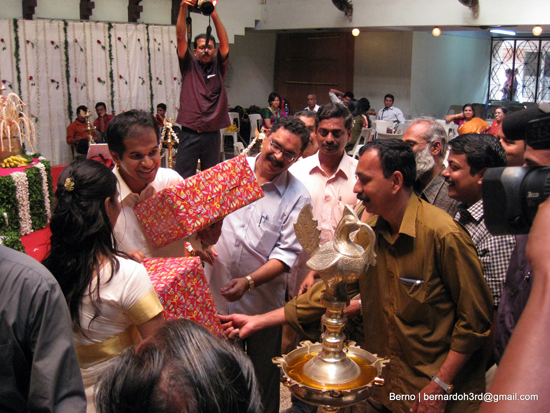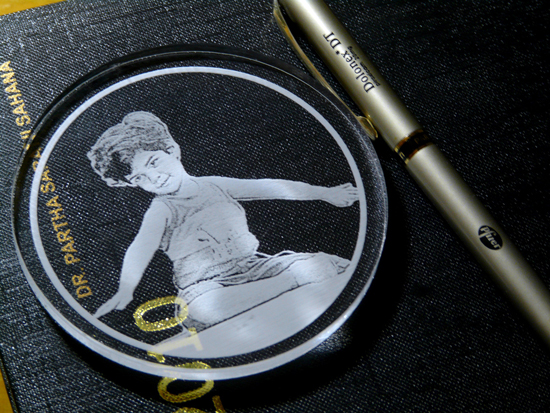Culture and Society: Gift Giving
General
The diverse religions of India favor ascetic spirituality over material indulgence. Hence, the monetary value of a gift is considered far less important than the sincerity with which it is given. Such sincerity is believed to aid one’s transition into the next life, whether Hindu, Muslim, Buddhist, Jain, or Christian. An ongoing struggle against corruption means that business gifts are usually interpreted as bribes.
Hospitality Gifts
Hospitality gifts are not necessary, but flowers are appreciated.
It isn’t compulsory to bring a gift when invited to an Indian home for dinner. However, fruits and candy (particularly gulab jamun doughnuts in syrup) are usually permissible, as are perfumes or flowers for the hostess or quality imported liquor for the host—providing the host drinks alcohol. A guest might bring toys for the children who are highly regarded in Indian culture. A box of sweets is a traditional hospitality gift during vibrant Hindu festivals. Guests from Western countries may bring a basic, but practical item which may not be available in India.
Presents are usually wrapped in colors thought to be lucky—yellow, green, and red—and are rarely opened immediately in case the content is disappointing or embarrassing. That said, Indians will occasionally open the present right away in order to demonstrate their gratitude for it. Thank-you presents aren’t typical, although if an Indian rooms with a family for several nights, he or she might ask if the host would like a practical item as a gesture of domestic goodwill.
When giving a gift to a female host, a male guest will ordinarily state that the present comes from both he and his wife/sister/mother or some other female family member. This avoids the gesture being misconstrued as romantic and adheres to religious customs governing male-female interaction.
Personal Gifts
Indians give inexpensive gifts (chocolates, flowers, small electronic gadgets) as tokens of friendship while more lavish items are offered on major family occasions; the extended family is perhaps the most important institution in Indian society. A newborn Muslim child is customarily given the juice of palm dates and the child's parents offer clothes and money to the midwife. At Hindu births and marriages, cash is normally given to those who are the focal point of the event. Multiples of 11, 51, 101, and 501 derive from ancient Hindu numerology and are thought to bring good fortune. White flowers and frangipanis are an appropriate funeral present for anyone who has lost a relative.
Religious festivals are perhaps the major gift giving event in the Asian subcontinent. The prime Hindu holiday, Diwali, is celebrated with the sharing of home-cooked meals and the exchange of gifts, especially ghughara (sweet fried pastries), fresh flowers, new clothes, dried fruit, and cards. It is traditional for women to receive jewelry—if the family can afford it— from close family members. Fireworks and paint are frequent gifts between Hindus because Diwali is the festival of light and liveliness, the optimistic marking of a new year. The North Indian festival of Rakhi celebrates the love of siblings and the strength of family. Thus, females honor their younger brothers by giving them candies, clothes, and dried fruit, and pay respect to their older brothers by handing them ‘masculine’ presents such as ties, tie-pins, and shirts. Brothers reciprocate with small gifts. Both females and their younger brothers wear a decorative bracelet called a rakshi on their arms, although some have been modernized into luxurious watches.
Business Gifts
In India, gifts are seldom given in business situations due to corruption fears. On rare occasions, an employee may be given something minor and business-related when he or she is promoted—a pen bearing a company logo, perhaps.
Taboos
When invited to someone’s home, an Indian wouldn’t bring white flowers or frangipanis for they are associated with death.
Due to religious strictures, Hindus are never given leather goods and Muslims cannot accept pigskin products, pork, or alcohol. Buddhists and more hardline Hindus will also reject items derived from any animals due to the doctrine of reincarnation.
Black and white wrapping paper is generally considered unlucky by all Indians.
Across all religions and cultural groups, it is normally unacceptable for a man to give a woman he is not related to a personal gift exclusively from him.
Article written for World Trade Press by Tom Sykes.
Copyright © 1993—2025 World Trade Press. All rights reserved.

 India
India 

